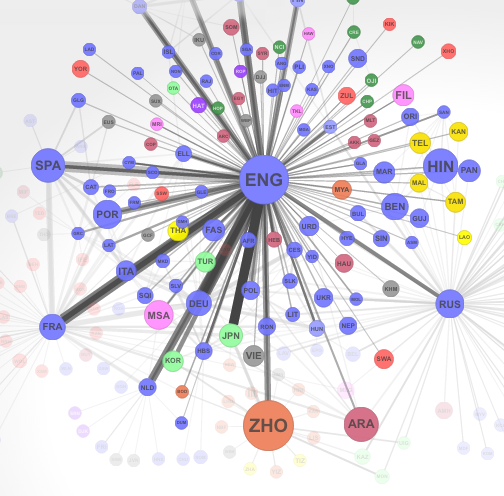The global language network
« previous post | next post »
 Michael Erard has a nice discussion in Science magazine of a paper recently published in PNAS: "Want to influence the world? Map reveals the best languages to speak", 12/15/2014.
Michael Erard has a nice discussion in Science magazine of a paper recently published in PNAS: "Want to influence the world? Map reveals the best languages to speak", 12/15/2014.
The original paper is Shahar Ronen et al., "Links that speak: the global language network and its association with global fame", PNAS 2014. And there's a cute interactive visualization.
But wait… no, that was the Global Language Monitor. Never mind.
J. W. Brewer said,
December 16, 2014 @ 10:59 am
There seems to be a mild disconnect between the Erard piece, which deprecates Portuguese and Mandarin, and the abstract of the Ronen et al. piece, which lists "Spanish, German, French, Russian, Portuguese, and Chinese" as the non-English "hub languages" (while by implication concurring that e.g. Arabic and Hindi don't have much of a hub function despite their large numbers of speakers). Maybe the list-of-six is in descending order of utility, so Portuguese/Mandarin are good, but not quite as good as Spanish/German? (Although if the whole list is ordered that way, I find it quite surprising that German ranks higher than French.) I suppose the other issue is how the "footprints" of the various hubs do or don't overlap, e.g. does Portuguese give you access to a significantly different slice of the world population one step further along the chain than Spanish does, or are the people you are reaching directly or indirectly via Portuguese mostly a subset of those you would have reached via Spanish?
Dan Lufkin said,
December 16, 2014 @ 9:30 pm
Where's Papiamentu? TV, newspapers, plenty of traffic with Spanish and Dutch. Interesting verb structure.
JS said,
December 16, 2014 @ 11:49 pm
It is interesting to play with the interactive graphic at this link. The answers to J.W. Brewer's questions are lurking there, but the user interface was a bit too screwy for me to want to mess with it much longer.
Did discover that Old Japanese links only to Russian, though. :D A function of translations out, given that Wikipedia/Twitter have yet to encompass the former, I presume…
JS said,
December 16, 2014 @ 11:52 pm
Sorry.. . The visualization was mentioned in the post :/
J. W. Brewer said,
December 17, 2014 @ 9:18 am
Yeah, I saw the visualization but didn't find it particularly intuitive or self-interpreting. I had thought the substantive Ronen et al piece was paywalled, but now I see that I just hadn't figured out where to click to see the whole thing. Maybe if I have time to read it carefully later, it will make the visualization make sense to me.
AB Hunter said,
December 18, 2014 @ 5:03 am
The reason 'Arabic' has less influence than some might initially expect is because there is no such language.
An 'Arabic' speaker from Morroco will have a lot of trouble speaking to many 'Arabic' speakers from the Middle East.
Mike said,
December 19, 2014 @ 4:40 pm
I notice that Japanese, Korean, and Turkish are all classified as Altaic. Has that been settled?